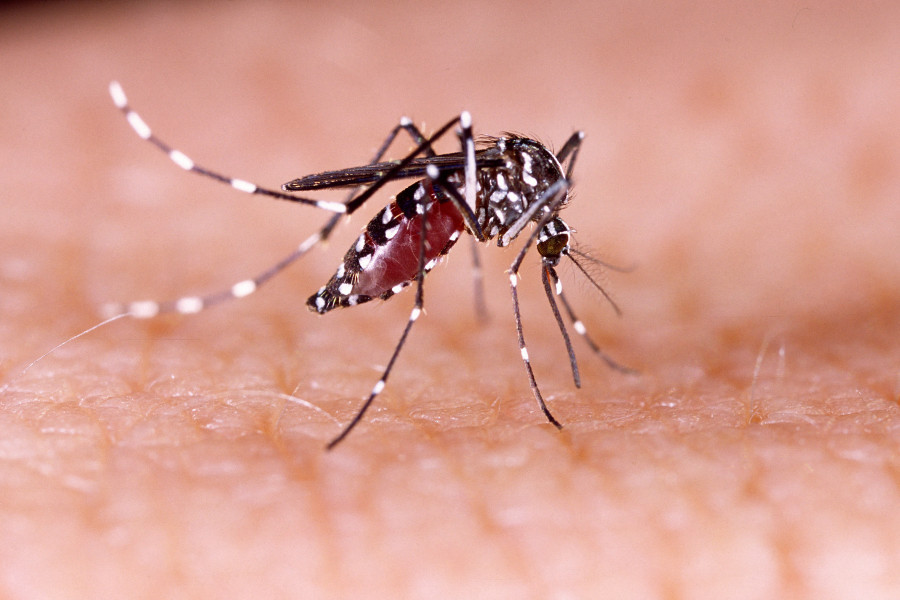
The Epidemiology and Disease Control Division is planning to hold discussions with the Private and Boarding Schools Organisation Nepal and the Capital’s hoteliers about the growing risk of a dengue outbreak in Kathmandu Valley, officials said.
The division’s move comes with the start of the pre-monsoon rainfall, which increases the likelihood of disease outbreaks, including dengue.
“We will hold discussions with the representatives of the Private and Boarding Schools Organisation Nepal and hoteliers about dengue risks and the role they could play to lessen the chances of an outbreak,” said Dr Gokarna Dahal, chief of Vector-borne Disease Control Section. “Schools and hotels are high-risk zones for dengue transmission, as uncovered water tanks, discarded plastic cups and bottles, tyres near schools and hotels provide breeding grounds for dengue-carrying mosquitoes.”
Dengue is a mosquito-borne disease, which is transmitted by female Aedes aegypti and Aedes albopictus mosquitoes. The same vector also transmits chikungunya, yellow fever and Zika viruses, according to the World Health Organisation.
Although post-monsoon is considered a high transmission season for the dengue virus, Nepal has witnessed outbreaks of the deadly disease in the pre-monsoon season too. In 2019, at least six people had died and over 16,000 were hospitalised with dengue fever.
The outbreak, which had started in the pre-monsoon period from Dharan, spread to 68 districts throughout the country.
Officials at the division informed that this year, 44 dengue cases have already been recorded from 21 districts throughout the country. According to data provided by the division, 10 dengue cases have been reported from Bardiya, four from Kailali, and three from Ramechhap district.
“Risk of dengue outbreak has increased due to the persistent pre-monsoon rainfall,” said Dr Sher Bahadur Pun, chief of Clinical Research Unit at Sukraraj Tropical and Infectious Disease Hospital. “Authorities should immediately introduce measures for vector control to lessen the chances of outbreak of the deadly disease.”
According to doctors, mild to high fever, severe muscle pain, rashes, severe headache, and pain in the eyes are some of the symptoms of dengue, and treatment should be sought immediately if anyone experiences those symptoms. While there is no specific cure for the disease, early detection and access to proper medical care can lower fatalities.
Dengue-transmitting mosquitoes breed in clean water and bite people in daylight.
Due to the drinking water crisis, people in the Valley collect water in various types of containers to last for several days. Uncovered water tanks and discarded plastic cups and bottles could become breeding grounds for dengue-carrying mosquitoes.
“Dengue search-and-destroy campaigns should be launched in all areas that are prone to the disease,” said Pun. “If breeding sites of the dengue-carrying mosquitoes are destroyed on time, chances of outbreaks will be lessened.”
A recent report of the United Nations “Climate Change 2022: Impacts, Adaptation and Vulnerability” states: “At least six major vector-borne diseases affected by climate drivers have recently emerged in Nepal and are now considered endemic, with climate change implicated as a primary driver.”
The report also shows increasing evidence that climate warming has extended the elevational distribution of Anopheles, Culex and Aedes mosquito vectors above 2,000 metres in Nepal. Of about 460 species of Anopheles, over 100 transmit malaria. Over 950 species of Aedes spread dengue, chikungunya, Zika, yellow fever and West Nile viruses. Over 1,000 species of Culex transmit Japanese encephalitis, filariasis and West Nile virus.
Vector-borne diseases are spread by carriers like mosquitoes, sandflies, kissing bugs and ticks. The report says that viruses like dengue, chikungunya and Japanese encephalitis are emerging in Nepal in hilly and mountainous areas.
“It has been evident that several factors including climatic ones will increase the cases of vector-borne diseases in the coming days,” said Dr Meghnath Dhimal, a contributing writer of the UN report. “We should bring mitigation and adaptation measures before an outbreak occurs.”
Meanwhile the Epidemiology and Disease Control Division said that it has allocated funds to the local governments to launch dengue search-and-destroy campaigns. Dahal, the chief of the Vector-borne Disease Control Section, said that his office has directed the agencies concerned to launch awareness drives to minimise the risk of dengue outbreaks and also to launch search-and-destroy campaigns.













